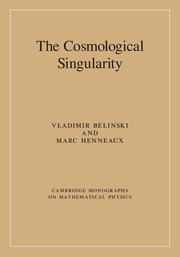Book contents
3 - On the Cosmological Chaos
from Part I - BKL Analysis
Published online by Cambridge University Press: 24 October 2017
Summary
Stochasticity of the Oscillatory Regime
In the asymptotic vicinity of the singularity, the oscillatory regime described above acquires a stochastic (chaotic) character.
Of course, any system of differential equations, no matter how complicated it is, has one and only one definite solution for each set of initial data. From this point of view we have no place for stochasticity. When we are speaking about stochastic behavior of the solution of differential equations we mean a quite different situation, namely the case when the initial data are not known exactly but are distributed in accordance to some statistical law. Together with the initial data, all characteristics of the solution at any subsequent time will also be distributed in some way.
In the framework of such a statistical approach there are two essentially different types of behavior. The first corresponds to the non-chaotic systems for which the initial distribution being picked around some points in the phase space generates an evolution which remains picked around the corresponding trajectories (i.e., usual classical solutions) starting from these points. The systems of the second type are chaotic in the sense that, for them, any initial distribution is going to spread out over the whole phase space in the course of the evolution, independently of how sharply localized the distribution was at the initial instant (some authors say that such systems have a source of stochasticity). Moreover, in the chaotic case, the final asymptotic regime which arises at a late time has a universal character completely independent of the form of the initial distribution. We stress that it is this last property (known as mixing) that represents the basic feature of chaos. For complicated nonlinear systems of differential equations, the chaotic behavior (if it is present) should be considered as a rather useful property because it gives the qualitative character of the general solution. Indeed for such a system only approximate forms of the general solution can be obtained and all parameters in such forms have no exact sense; they are unavoidably uncertain and can be interpreted as statistically distributed.
Information
- Type
- Chapter
- Information
- The Cosmological Singularity , pp. 48 - 56Publisher: Cambridge University PressPrint publication year: 2017
